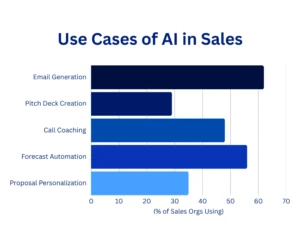The sales industry is undergoing a significant shift from traditional practices to advanced and AI-driven strategies. This transformation is reshaping how sales teams interact with their customers, improving lead generation, optimizing sales operations, and boosting revenue. The current global economy is undergoing challenging times with rising customer demands and technological advancement. To remain competitive in the market, every business, every team has to upskill and change their strategies of working. Artificial intelligence is at the core of these changes, offering efficiency, accuracy, and more productivity in businesses. In this blog, we shall discover all the aspects of Generative AI for sales sector, its benefits, challenges, applications, and best practices.
Generative AI for Sales- An Overview
Among all the technologies under the AI umbrella, generative AI boasts the most impactful features and benefits. We have already experienced the impact of generative AI in manufacturing, marketing, finance, and content creation. Moreover, in this guide, we shall also see how generative AI is used in the sales sector. Advanced AI models like the GPT-4 and GPT-5 power smart sales platforms, offering more natural and personalized customer interactions. These intelligent AI-powered platforms help automate outreach and provide customized recommendations. These tools reduce response times, enhance communication, and help sales teams focus on more important tasks. Thus, it improves overall sales performance.
Generative AI specifically plays an important role in lead generation. It creates targeted outreach messages, analyzes potential leads, and generates custom sales pitches. Through personalized communication strategies, the sales team can increase conversion rates without much effort. Generative AI for sales also helps in reshaping how sales teams learn and grow. It tracks their performance and provides real-time feedback, helping them improve their skills and stay ahead of market trends. This also boosts long-term sales performance.
Apart from this, generative AI also reshapes sales analytics by offering data-driven insights into customer behaviour, sales trends, and market dynamics. These insights allow sales teams to adapt with real-time strategies, improving pipeline management, lead conversion, and closing rates.
Current Market Scenario of Generative AI for Sales
Survey reveals that around 84% users using generative AI found increased sales with AI-enhanced customer interactions. This number makes it evident that, upon effective implementation, generative AI can directly contribute to increased revenue. Sales professionals expect to use generative AI in basic content creation(82%), analyzing market data(74%), and automating personalized sales communications(71%). These expectations show how sales teams are planning to use GenAI in automating routine tasks, gaining deeper insights into the market, and focusing on strategic activities.
Benefits of Integrating Generative AI into Sales
There are various reasons why there is an increased adoption of generative AI in sales. One of primary benefits of generative AI is enhances efficiency through automation. Let us see the major benefits of GenAI in sales:
-
Enhanced Personalization
Personalization capabilities of generative AI are highly valued by sales and marketing teams in the current economy. Customers’ demand for personalization seems unreal to fulfill when you scale. However, generative AI allows the sales team to customize their outreach and communication strategy to convert more leads. It offers personalized recommendations to engage existing and potential customers, enhancing customer experience.
-
Increased Efficiency
Through automating lead generation, customer outreach, and follow-up, generative AI allows sales staff to focus on other important tasks. Thus, routine work automation, a more strategic approach, and time saving lead to increased efficiency.
-
Strategic Decision-Making
Utilizing its analytical capabilities, generative AI for sales offers valuable insights to leaders. These insights help stakeholders make data-driven decisions that are more likely to support growth. Generative AI analyzes sales data, market conditions and provides real-time opportunities to adapt strategies that align with the market.
Use Cases of Generative AI for Sales
When we talk about the application of generative AI in sales, the first thing is automation and optimization of key tasks, allowing teams to focus on high-value activities. Right from lead generation to performance analysis, AI-powered solutions improve efficiency, personalization, and decision-making across the sales process.
-
Identifying Potential Leads
Generative AI analyzes data from social media, websites, and custom databases. It then prioritizes prospects, scores them based on engagement and past data, empowering the sales team to focus on meaningful interaction and drive conversions.
-
Evaluate Lead Quality
The artificial intelligence technologies not only identify the lead, but also evaluate it. It can study specific customer behavior and preferences to prioritize only the high-value leads. This saves time and effort spent on leads that don’t convert, and quickly converts potential leads.
-
Automate lead Outreach
Generative AI initiates personalized email sequences for different segments of leads. These emails are tailored to speak to the customer based on their interest and are automatically dispersed, saving time.
-
Multi-Channel Engagement
AI-powered tools facilitate multichannel interaction with customers through email, chats, or social media. It can automate messages across email, chatbots, and social media to ensure consistent contact.
-
Real-time Responses
Generative AI for sales provides prompt responses to customers’ questions in the customer interaction phase. It offers relevant answers or resources based on the query context.
-
Engagement Analytics
Generative AI provides useful insights regarding customer engagement, like response rates and customer preferences. This would allow you to cater to your target customer base in a manner that appeals to them the most.
-
Personalized Product Recommendations
Have you received purchase recommendations based on your search history? That’s the wonder of generative AI in sales. It recommends specific products or services that a potential customer might be looking for. Real-time product recommendations have more chances of conversion than traditional marketing methods.
-
Dynamic Proposal Generation
One of the basic features of generative AI is the generation of novel content. It can create a dynamic proposal in accordance with market trends and customer requirements. It also automates drafting contracts and quotes apart from proposals.
-
Scenario Planning
Generative AI allows simulations of different scenarios to gauge the consequences or impact of changes or decisions before actually doing them. This allows businesses to understand how different factors can affect sales outcomes.
-
Personalized Followups
Generative AI sends customized messages based on customer interactions and preferences. Such AI-powered tools generate personalized follow-up messages, making every interaction appealing to the client.
-
Automated Reminders
AI-powered business solutions provide automatic follow-up reminders to ensure timely communication. These reminders can also serve as a reminder of key dates, tasks, follow-ups, and deadlines. This helps improve both pipeline management and time management.
-
Identifying Customer Behavior Patterns
One of the best benefits of the analytical features of generative AI in sales is in understanding customer behavior patterns. Generative AI analyzes customer behavior, sales cycles, and team performance to discover hidden patterns and insights. These insights help refine strategies, improve efficiency, and boost overall performance.
-
Feedback-driven Communication
Generative AI-powered customer support tools adapt follow-up messages based on customer feedback and interactions. Thus making it feel more natural and personalized.

Challenges and Considerations for Integrating GenAI into Sales
Integration of generative AI into sales operations can be really beneficial for the overall process. However, it comes with its challenges that need to be addressed before you plan to integrate it into sales operations. These challenges include
-
Bias and ethical concerns
Artificial intelligence relies heavily on its training data for providing accurate and relevant responses. In case of biased data quality, AI tools tend to exaggerate the bias and result in skewed responses. Such biases can affect its authenticity and reliability for business purposes. Ethical use of generative AI is also an important concern while implementing AI in the workplace. It’s responsible use and proper governance
-
Data privacy and security risks
Data privacy is another concern for industries that have to deal with sensitive data. Industries that are compliance-heavy, or law-related, or deal with any other kind of data-sensitive operations, are at risk of data breaches because of AI use. However, using an encryption approach, sophisticated security systems, and trusting reliable AI partners for deployment can help keep your data safe.
-
Transparency and interpretability
Many AI tools have tried breaking down the data processing stages to maintain transparency of how the model works. Despite these, to a certain extent, all AI tools function in a “black box” manner. A clear understanding of AI technologies, functioning, and techniques can help businesses leverage AI without the risks.
-
Integration and operational challenges
Although the integration of generative AI in sales promises an increased revenue in the long run, the initial stage of integration comes with heavy expenses. From a supportive infrastructure to initial investment and maintenance, it might not be feasible for small organizations or startups. Integration challenges are another concern that can be solved by partnering with a reliable AI development service provider.
-
Adoption and cultural resistance
Many staff members might not readily accept this shift as it requires them to learn new things and upskill. Many people have worked in the industry for years, and a sudden change in the workflow can disrupt their natural liking for the same work. To avoid this, training, upskilling, and preparing the staff for upcoming changes should start before the AI adoption project.
Conclusion
With the evolution of sales strategies, generative AI is certain to transform sales by providing more tailored and advanced solutions over time. Generative AI boasts content generation, automation, personalization, and analytical features, which are rapidly reshaping the sales sector and every business across industries. If you are a business owner and wish to implement generative AI in your workflow, now is the right time. With increasingly competitive market conditions and rapid AI adoption, early access to AI technologies can give you a competitive edge in the market. For a detailed understanding of AI and a customized AI adoption strategy, you can book a demo with AnavClouds Analytics.ai. We are an AI development company known for providing custom AI tools that specifically meet your business requirements.
FAQs
How can generative AI be used in sales?
Generative AI in sales can be used for drafting proposals, contracts, and quotations. It can be used to gain insight into the market and sales performance. Generative AI in sales can also be used for its personalization features in customer engagement.
Which AI is best for sales?
Many artificial intelligence platforms offer features useful in the sales field. However, to fully harness the potential of generative AI for sales, one should opt for a customized AI tool that is tailored to suit their requirements.
Can you use AI for sales?
Yes, AI can be used to automate several sales tasks utilizing its machine learning algorithms. Routine tasks like personalized emails, timely follow-ups, and proposal drafting can be streamlined to free up sales staff for higher-value tasks. This improves overall efficiency.
Will AI replace B2B sales?
No, AI will not replace B2B sales; instead, it will reshape the way it works. It includes automation of low-value or routine tasks, which allows the staff an opportunity to upskill and focus on more strategic tasks.
What is the future of AI in sales?
With the increasing adoption of AI and automation technologies in businesses worldwide, the sales sector will also shift towards this technological upgrade. AI will significantly contribute to routine, repetitive, and low-value tasks, while the strategic, high-value tasks will still be under human supervision.



